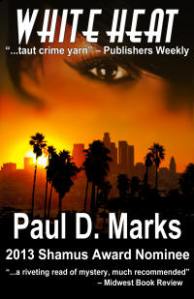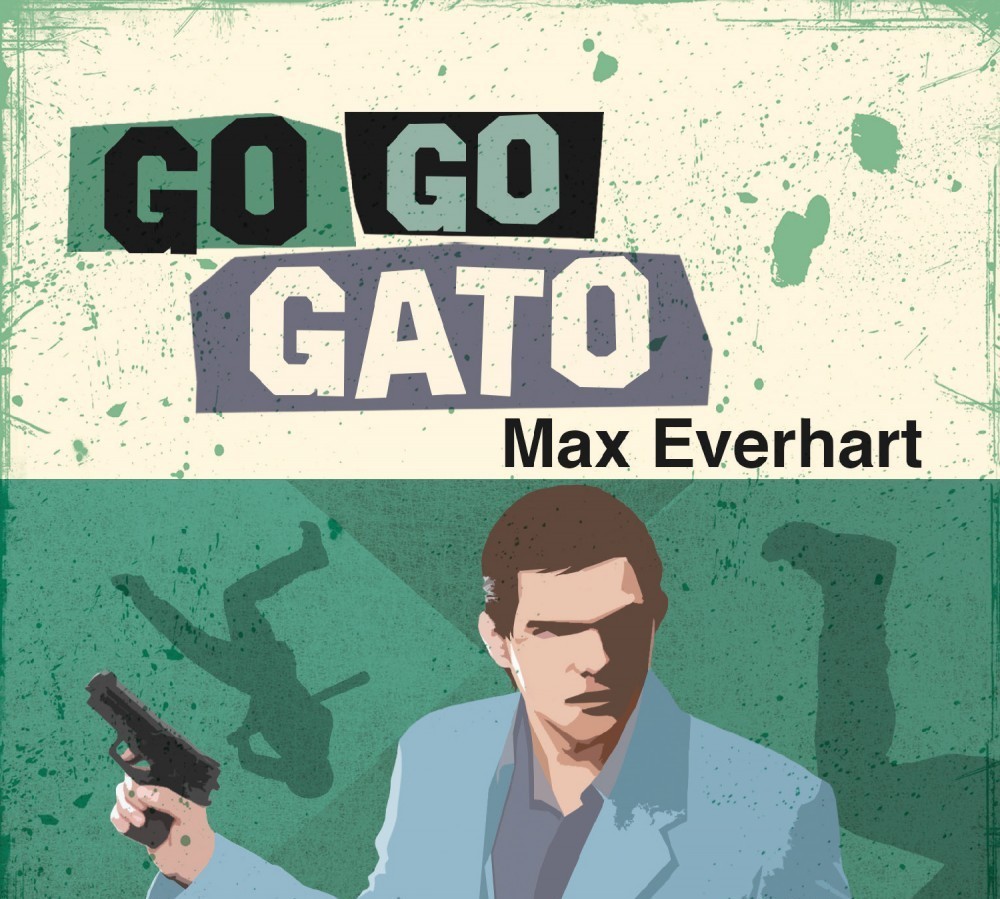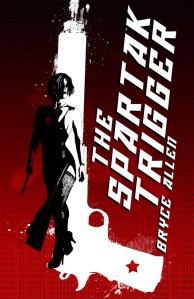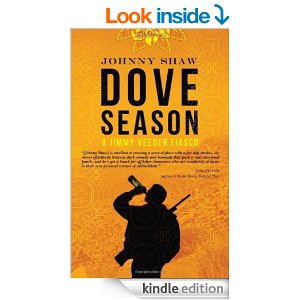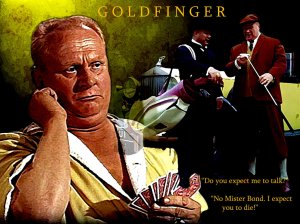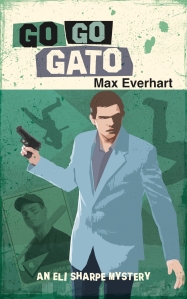Why do you write?
MARKS: I write so I can kill people…on the page that I can’t kill in real life……….. Seriously, why do I write – why does anyone write – because we have to.
When do you write?
MARKS: I keep “vampire hours,” so mostly I write in the middle of the night. My sleep schedule has shifted over time. I’ve always been a late-night person. But that used to mean going to bed at 2 or 3 or 4am. Now it means going to bed at 9am and getting up at three or four in the afternoon. So I tend to write starting at about 11pm these days. It’s quiet. There’s no interruptions. And the nighttime sets the proper mood for most of what I write.
Where do you write?
MARKS: I write in my home office. Sometimes I do it other places. But my office has everything I need. I have a nice view. Pictures on the wall that inspire me. Mostly album covers and movie lobby cards, some other things. And, of course, my picture of Dennis Hopper flipping the bird from Easy Rider. I also have access to my addictions, diet cherry Pepsi and Waiwera water. Plus I have my assistants, my dogs and cats, to help out.
If I’m out and about in the world, coffee shop, beach, library, I get too distracted by what’s going on around me…but that can be fun. Too much fun. And you might think there would be distractions in the office, TV, phone and food. But I’m pretty good at avoiding those. What I’m not good at avoiding is the internet. I love to research and it makes me feel like I’m working even when I’m not.
What do you write?
MARKS: I write mostly noir and mystery fiction, but sometimes mainstream and humor or satire. For example, my Shamus Award-Winning novel, White Heat, is a noir-mystery-thriller set in and during the “Rodney King” riots (see below for more details) and its sequel, Broken Windows (not yet published) is in the same vein. I’ve had over 30 short stories published that run the gamut from noir to mainstream and satire, including several award winners.
How do you write?
MARKS: I put my ass in the chair, goof for a few minutes on the computer, doing whatever I want, and then I start in on one of my projects. Doesn’t matter if I’m not in the mood – you get in the mood by doing it. And even if it’s not going well, just write, stream-of-consciousness. Hone it later.
Tell me about your previous books and where they can be found.
MARKS: White Heat and L.A. Late @ Night, a collection of five of my previously published short stories, can be found on Amazon in both paperback and e-versions, as well as other venues. White Heat is my Shamus Award winning novel that Publishers Weekly calls a “taut crime yarn.” It’s set during the “Rodney King Riots” of 1992 and is about a screwup P.I. who inadvertently leads a murderer to his prey and has to find the killer in order to make things right. L.A. Late @ Night is a collection of 5 of my previously published short stories. All set in L.A. and in genres ranging from noir to hardboiled to medium boiled. Lawrence Maddox, the reviewer in All Due Respect, Crime Fiction Magazine said this about that collection: “You could hate L.A. for the way it screws with the decent folk so deftly conveyed here, but you won’t be able to put this highly recommended collection down.”
Tell me what you’re currently working on.
MARKS: I’m working on a slew of projects. The sequel to White Heat and another novel, this one a mystery set on the World War II homefront, are already done and sitting with an agent. So I’m currently working on two stand-alone novellas. One for a publisher of novellas and one for myself. Both are mysteries, but one is more noir than the other. But the other is interesting because it’s set all in one location. But if I told you exactly what they were about, well, you know… I’m also working on three different short stories, plus the blog I write for every other Friday (http://7criminalminds.blogspot.com/). And I’m co-editing an anthology of mystery short stories from various writers called Coast to Coast: Murder from Sea to Shining Sea (that may or may not remain the final title), that includes several big name and award-winning mystery authors. I’m definitely not wanting for things to occupy my time.
Tell me something funny.
MARKS: I write so I can kill people on the page that I can’t kill in real life……….. You gotta admit, that’s pretty funny….
Thanks for having me, Max!
Find Paul D. Marks at:
www.PaulDMarks.com
https://www.amazon.com/author/pauldmarks
facebook: www.facebook.com/paul.d.marks
twitter: @PaulDMarks
blog: http://www.7criminalminds.blogspot.com/
blog: http://pauldmarks.blogspot.com/
http://www.amazon.com/White-Heat-P-I-Duke-Rogers-ebook/dp/B007SIR8QG
http://www.amazon.com/L-A-Late-Night-Mystery-Streets-ebook/dp/B00I9289HM
Paul D. Marks’ novel WHITE HEAT is a 2013 SHAMUS AWARD WINNER. Publishers Weekly calls WHITE HEAT a “taut crime yarn.” And Midwest Book Review says “WHITE HEAT is a riveting read of mystery, much recommended.” Paul is also the author of over thirty published short stories in a variety of genres, including several award winners – and L.A. LATE @ NIGHT, a collection of five of his mystery and noir tales. His story HOWLING AT THE MOON will be in an upcoming edition of Ellery Queen. And he has the distinction, dubious though it might be, of being the last person to have shot a film on the fabled MGM backlot before it bit the dust to make way for condos. According to Steven Bingen, one of the authors of the recent, well-received book MGM: Hollywood’s Greatest Backlot: “That 40 page chronological list I mentioned of films shot at the studio ends with his [Paul D. Marks’] name on it.”
